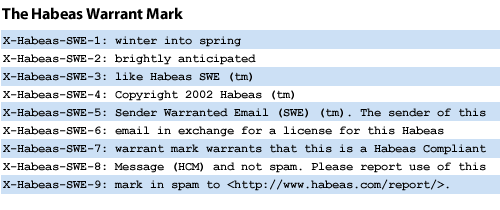Anti-Spam Haiku
http://habeas.com/ I still don’t totally understand how this company uses the power of haiku to defeat spammers. But I think I like it.
I think it works thusly:
– If you promise not to spam people and sign up with them, you get 8 points subtracted from your SpamAssassin score when you use the Habeas header in your emails.
– If you (illegally & inappropriately) use the Habeas header in your email, then when the Habeas people catch you, they’ll tell SpamAssassin that the IP address that sent the email gets 8 points added to their spam score.
– If you illegally use the Habeas header, they’ll sue your ass off, but quick, for copyright infringement (the poem), defamation (their header would never voluntarily associate with spam), and license infringement (you didn’t sign up for the Habeas service).
Nice. Of course, a distributed offshore email relaying scheme can probably get around it. Forged headers might also be able to get around it. The battle continues…
(For reference, using the phrase “WIN FREE VIAGRA!” in the subject field of an email costs the message only about 4 points. A difference of 8 points will almost definitely make or break an email’s spam threshold in SpamAssassin. I’ve only every been marginally happy with SpamAssassin’s performance. I set it to a threshold of “8” and it catches about 10 spams a day (that’s 40% of the spams I receive recently). If I set it any higher, it starts catching legitimate mail. Still, SpamAssassin from my email hosting company and Cloudmark Spamnet on my client have been working together to do an excellent job recently.)

Thanks to Dada Mail for pointing out this Habeas thing to me.
Oh and I also just noticed….
Vispul’s Razor (the source code for Spamnet) is open source. The plug-in for MS Outlook (the Spamnet service) isn’t.
The Vispul’s Razor / Spamnet collaborative filtering servers are located at cloudmark.com.
That’s an interesting collaboration between open source and not… The unix folks are free to develop the brains of the system in an open source environment while Vispul is (hopefully) making money off the gazillions of Windows clients. If you had unix at home, you’d be able to get the service for free. But hey, Vispul is only charging $2.00/month for the service. It’s well worth it for any individual client to buy the service. Everyone wins. Open source seems to work.